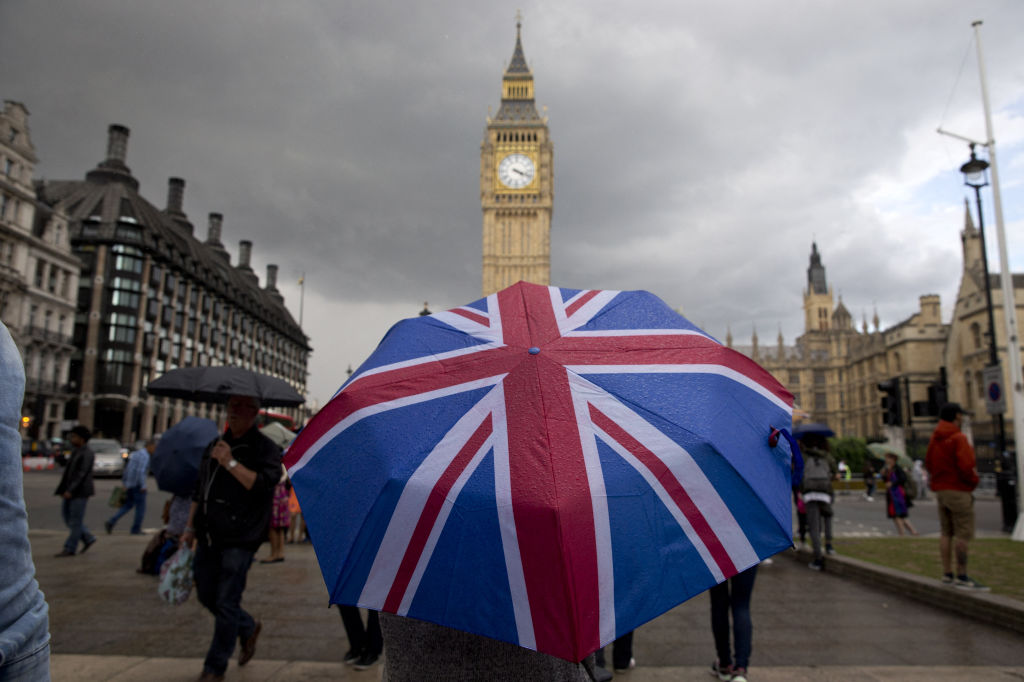Since the United Kingdom left the European Union five years ago, the pair have been in battle to prove who has performed better. But the real story of the past five years is not a stagnant UK falling behind a buoyant EU, but of Britain and Europe being trapped in the same cycle of relative decline. It’s America that has quietly raced ahead of Europe this century.
Following the pandemic it has become impossible to ignore the gulf in economic vitality between the US and Europe, the former growing by 16.3 percent per capita since 2008. There are very good reasons for America’s success, or rather, Europe’s decline. The EU and the UK increasingly treat their industries as pieces of heritage which must be preserved against disruptors and foreign competition. A precautionary principle has been allowed to squash entire industries like GM crops and fracking. European climate policies revolve around stopping people doing things and setting restrictive targets, rather than encouraging low-carbon technologies.
Then there is Europe’s work-shy culture: far from being just a British phenomenon, the average German employee works sixty-seven fewer hours per year than a decade ago.
Regardless of which president has been in the White House, so far this century the country has largely been pro-innovation and growth. This has led to some spectacular results: in a list of the top 100 global companies by market capitalization, sixty-one are US-based. In contrast, only twelve are based in the EU, five in the UK and three in Switzerland. The top European company — French luxury goods maker LVMH — comes in at twenty-fourth, followed by Danish pharmaceutical company Novo Nordisk, maker of weight loss drug Wegovy, at twenty-sixth.
Europe’s reaction to this is to get angry rather than to get even. Draconian EU regulation of tech, in particular, is beginning to look like envy. Europe doesn’t like it that the tech giants are nearly all American.
Without economic growth, it becomes impossible to sustain that other great claim to the superiority of European civilization: efficient and universal public services. Yes, the US healthcare system seems to Europeans an expensive mess, especially for those who fall through the cracks. Yet Europe’s healthcare systems are increasingly creaking. All have similar problems, caused by aging populations and shortages of qualified staff. We discovered during the pandemic the inadequacies of Italian hospitals: the country has since been forced to borrow doctors from socialist Cuba. In the Netherlands, even before Covid, the shortage of children’s hospital beds was so acute that patients had to be sent to Belgium.
Europeans like to boast about their high-speed train network, which sounds fantastic until you take one — in Germany, a third of long-distance trains run late. Nor is Europe the haven of low crime that Europeans like to believe. Violent crime has exploded in the countries we used to think of as the safest. In Sweden, gangs habitually fight with grenades. In the Netherlands last February, the six-year Marengo trial finally resulted in the jailing of Moroccan drug-dealers — but not before the murders of a string of informers, a lawyer and a TV journalist. The identity of the judge had to be concealed.
Europeans shake their heads at America’s re-election of Donald Trump, a man who is often described by his critics as a “fascist.” But the nice, liberal Europe of their imagination no longer exists (if it ever did). It is the EU which has all the far-right parties — excluding Brexit Britain. Europeans shake their heads over Trump’s fence along the Mexican border and his program to deport illegal migrants.
Yet European countries are following many of the same policies. Hungary has erected a Trump-like fence along its border. Germany, where a decade ago Angela Merkel devised what she called Willkommenskultur, has recently reinstated border formalities with neighboring EU countries. This has happened in spite of the rules of the Schengen Agreement, a 1990s pact to eliminate customs formalities between many European countries.
Europe is becoming a macrocosm of Athens, where past glories look down on the tawdry reality of the present. Many Europeans also proudly hold up the continent as a beacon of liberal democracy, which they see as having been undermined by Trumpism in the US. But Europeans have a very different concept of democracy to Americans. To the former, it means having a permanent legal infrastructure to impose certain social and economic policies which remain in place whoever is in power.
The difference can be seen in the UN Universal Declaration of Human Rights — which was influenced heavily by US lawyers — and the European Convention on Human Rights — which was drafted by European lawyers a couple of years later, and which still governs European democracies.
While the former declares that “the will of the people shall be the basis of the authority of government,” the latter has no equivalent cause. This was because in postwar European minds, democracy was what gave Germany Hitler. That “will” had to be tempered to try to ensure that a demagogue could never again rise to the top. “Democracy,” as it were, is there to protect the people from themselves.
That is the root of so many problems in Europe at the moment, where people are starting to rise up against the political establishment which has kept them in their place for the past eighty years. It was the root, too, of Brexit: the campaign for which was won by the slogan “Take Back Control.”
The trouble is that Britain, so far, has not taken advantage of those freedoms. A few trade deals have been done. There has been a little deregulation, but that has been dwarfed by cases in which UK governments have used their freedoms to impose extra regulations, such as making life even more difficult for employers trying to create jobs.
It was always the case that the disadvantages of Brexit, such as increased friction in trade, were going to come quickly but the advantages were going to come later — and only then if Britain had a government which was prepared to make the right decisions.
With Keir Starmer’s Labour government seemingly determined to turn Britain into just another brand of European social democracy, that looks a long way off. Britain’s first decade outside the EU looks as if it will have similar, disappointing results as its neighbors. It’s America that looks set to keep racing ahead.
Far From EUtopia: How Europe is Failing and Britain Could Do Better by Ross Clark is published by Abacus. This article was originally published in The Spectator’s March 2025 World edition.


























Leave a Reply